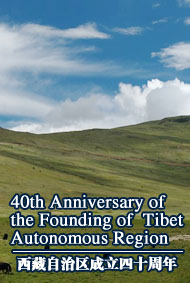|
Tibetan Naming Culture
( 2005-10-27 )
The Tibetan people have given names but no family names. Most of the given names, usually two or four words long, originate from Buddhist works. Hence, many Tibetan people have the same names. For differentiation purposes, Tibetans often add "the old" or "the young," their character, their birthplace, their residence, or their career title before their name.
When a baby is born, the parents ask the lama to name the baby. Most of the names are given by the lama and mainly comes from Buddhist scriptures, including some words symbolizing happiness or luck. For example, there are names such as Tashi Phentso, Jime Tsering, and so on.
 Family names no longer privileges for Tibetan nobles Family names no longer privileges for Tibetan nobles
In the first half of the 20th century, Tibet was still a feudal-serf society in which names marked social status. At that time, only the nobles or living Buddhas, about five percent of the Tibetan population, had family names, while Tibetan civilians could only share common names.
After the democratic reforms in Tibet in 1959, the nobles lost their manors and their children began to use civilian names. Now only the old generation of Tibetans still bears manor titles in their names.
With the old generation of Tibetan nobles passing away, the traditional family names indicating their noble identities are fading out. For instance, Ngapoi and Lhalu (both family names and manor titles) as well as Pagbalha and Comoinling (both family names and titles for living Buddhas) are vanishing.
At the same time, another problem has surfaced. Tibetans believe inBuddhismand usually invite living Buddhas or lamas to christen their children or just name their children with commonly used words indicating kindness, prosperity, or goodness. However, without family names, Tibetan names are repeatedly used.
For instance, many Tibetans favor "Zhaxi," meaning prosperity; as a result, there are thousands of young men named Zhaxi in Southwest China's Tibet Autonomous Region.
The namesakes also bring troubles for schools and universities, especially during the middle school and high school examinations each year.
Now, due to all these complications, a growing numbers of Tibetans are seeking unique names to display their uniqueness, such as adding their birthplace before their name.
Tibetan family names were once used to indicate political status and now the civilians can also use family names or unique names to indicate their individuality. The stories behind the names reflect the changes in Tibetan history.
|

